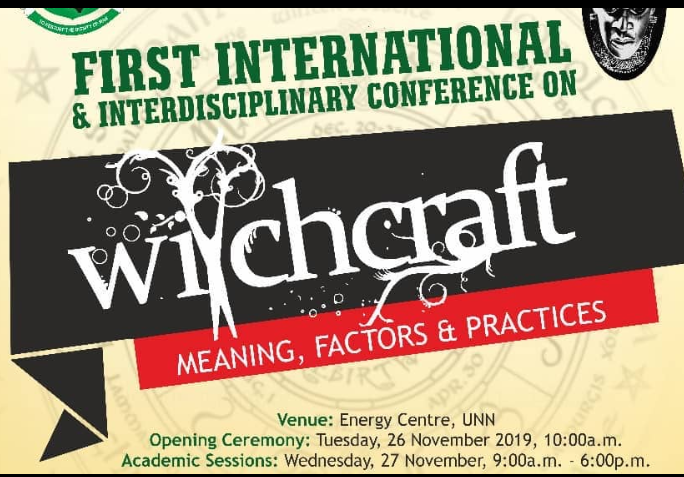
By Hannu Afere
As Africans, we are inundated with stories about the supernatural from a very early age. Now, although it is not a practice peculiar to our race, our continent being a melting pot for thousands and thousands of belief systems, cultural practices, oral tradition and colonial influences, our society makes visibility for any individual who seeks to interrogate the metaphysical aspects of our ethos rather difficult.
From time immemorial, seemingly inexplicable encounters with nature and the paranormal have been feared, revered and tabooed. Phenomena now explainable by modern science once had and still have entire cults dedicated to them. A scientific approach to these beliefs just doesn’t work.
Whereas a discerning apeople would immediately want to know the _why_ and the _how_, we find ourselves dealing with folks today who are conditioned to cower and avert their faces at the mention of mystical powers, juju and all such terrifying mysteries.
Understanding that a large part of the metaphysical has to do with psychological state of the believer, is a step in the right direction.
When an individual is required to fast and pray for a long time, what’s the more likely end result? Hallucinations or celestial vision? When an individual with a preexisting schizophrenic conditions is allowed to counsel and teach, what happens when they are appointed Shepherd of the flock? These are some of the questions!
Which is why I am impressed by the Academic Conference held in the Prof. BIC Ijomah Center for Policy Studies and Research, University of Nigeria, Nsukka.
The vehemence with which CAN and other ultra religious folks on social media kicked against such an academic conference, tells one all what one needs to know about the weapon of fear, the blissfulness of ignorance and the agenda of salvation merchants.
No pastorpreneur who wants to keep making money will support a move to thoroughly explain the meaning, factors and practices of witchcraft to the general public. The shops of all Bishops will close once they announce that all the fortification by way of anointing oils, holy water, bulletproof aprons, etc against witchcraft is simply a money making venture.
To the man on the street, witchcraft is when a traditional worshipper does bad juju to harm his enemy. But is this the sole preserve of traditionalists? Aren’t there many churches under the banner of CAN who specialize in saying prayers for their enemies to die?
What’s the difference between six and half a dozen?
I think that the first questions anyone who has interests in this topic should ask is “WHO is a witch? Also, WHAT is pagan?”
Examining the commercialization of fear, the inherent misogyny and gerontophobia as well as the complete disregard for science and logic, one begins to understand what is what.
To the regular folk reading, I shall pose these questions again: Who is a witch? What is pagan?
Is a witch any old woman living alone, who looks a certain kind of way or who is suffering from dementia?
Is a witch someone who has learned to harness their energies, someone who is in tune with their spirit and nature?
Or is a witch a person with a knowledge of science– enough to enable them show off shocking parlour tricks?
Someone whom it would be okay to quote Bible verses such as “Suffer not a witch to live” at?
When you describe something as “pagan”, isn’t it with a tone of derision? As though being superstitious about a different set of things make one superior. Do you not realize Christianity IS “pagan” to me if I am, for example, an Ogun worshipper?
These are the basic questions anyone with half a brain must ask. Religious beliefs are always biased and never objective. To heal our societies we must do away with such archaisms and embrace the scientific approach. But then again judging from the happenings of the last few weeks, I can say confidently– albeit sadly– that as a people, we aren’t ready.
Ironically, it is the folks who are often seen quoting Hosea “my people perish for a lack of knowledge”, who are the most guilty.
Hannu Afere (c) 2019




Comments (6)
Jessysays:
December 2, 2019 at 12:21 pmThis is great.
Runjsays:
December 2, 2019 at 12:24 pmI think everyone needs to read this. I’m a Christian but there’s a line and Africans have suffered in the hands of many supposed men of GOD, and yes there’s freedom to your Faith, regardless of what anyone believes to be the light
Folakesays:
December 2, 2019 at 12:47 pmA proud witch! …. We’ve had conversations on this John. All I’ll say is, we only truly begin to live, when we let go of fear and embrace all that we are.
Flourishsays:
December 2, 2019 at 11:04 pmHannu say na pastorpreneur. Which is sadly true. Every body wants to make money from everything.
Chidiebube onye Okohiasays:
December 3, 2019 at 6:22 amThe masses are bewildered herd. The problems we might attribute to the Bible is that of miseducation and misreading. The Christian, in his/her pristine state, is not a flawed, pathetic character.
While to a large extent I agree with your position, I have my reservations.
Ebiere Okoesays:
December 3, 2019 at 12:09 pmReligion is the harbinger of stealthy ignorance in Nigeria, when it comes to matters regarding spirituality, and what needs to be known properly for what it stands. It is too stereotyped, the concept of witchcraft that is. It is etched in the psyche way too deep!